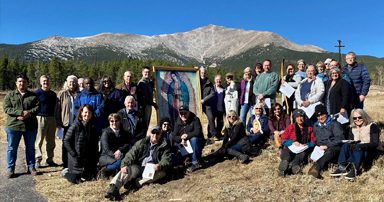The purpose of this guide is to help you identify and prepare methods to stay in contact with other CORAC members, friends, and family under adverse circumstances. Please note: the use of new communication methods requires experimentation and learning, and there are no guarantees that they will work exactly as anticipated.
Consider whom you would like to contact in an emergency. Then acquire and practice with the equipment and services you may need, as described below:
- If you are a CORAC member and wish to be added to your regional Signal Group, install the Signal app on your phone and/or computer from (We recommend that you download the app to both – Signal on your phone will synchronize with Signal on your PC automatically. You can also send documents from your PC more easily, if necessary.) Then contact the Signal Group leader for your region and request to be added to the group. This group may enable you to communicate situational information with the regional team. Signal relies on the Internet to relay messages. If your home Internet service is down, but your cell service is still working, you may be able to use the Signal app on your phone. If ‘The’ Internet is down (as in a widespread outage), Signal will not work.
- If you already have a landline telephone, buy a line-powered phone that will operate without batteries or grid power.
- If you have a smartphone, purchase a Zoleo unit to enable texting via satellite if your phone is not able to text normally. A monthly subscription is required. The person you are texting only requires a Zoleo unit if their cell service is also disabled. Zoleo may be the right solution to reach family members across country.
- For communications from a fixed, rural location, consider Starlink or another satellite Internet service.
- If you would like to listen to CORAC amateur radio and/or public radio broadcasts, consider acquiring a shortwave (high frequency) radio receiver and antenna system.
- To communicate locally (within a few miles of your home) acquire handheld radios that use GMRS, FRS, or MURS, technology.
- In weak signal areas, install one or more cell phone signal boosters to use if your cell phone service is still operating.
- To charge your electronic devices when the grid goes down, you should consider acquiring a small solar + battery backup system. Remember to shake / warm batteries to maintain them in freezing weather.
Learn and Practice Skills
As important as it is to have backup communications equipment, it is equally important to acquire and practice skills for operating your communications equipment. You may also choose to specialize in services you can provide for others, such as battery charging or setting up shortwave receivers with antennas. Obtaining your amateur radio licenses (Technician, General and Extra) will open up opportunities to communicate at greater distances on the amateur VHF, UHF and HF bands.
Initiate and Respond to Messages
- When you receive any communication, it is critical to promptly respond in kind (reply with an acknowledgement) to make it clear to others that you ‘got it.’
- If the received message was complex or received over a lossy channel (or one where it is not clear which message you are replying to), repeat back the basics of what was said to ensure they know which communication you received. (‘I understand that you are well and staying put but packing in preparation for possible evacuation,’ for example.) If you do not have time for this, even a simple ‘Thanks, I understand’ or ‘message received’ or ‘copy that’ is better than no reply at all.
- It may not always be possible to respond ‘in kind’ (via the same communications system – for example, you hear a message broadcast over shortwave radio but you cannot transmit back, or you receive a text message but are unable to send a text.). In this case, simply do your best to respond via some other communications method if possible. Briefly summarize the message content (or timestamp / message number) so it is clear to the recipient which message you are acknowledging (for example: ‘Received your broadcast regarding saving fuel for evacuation’).
- Keep in mind that your replies may be received much later, or not at all – but you should still try.
- You should plan to communicate with others clearly, rapidly, and proactively as their situations and decisions change.
Try Various Options
Under the scenarios presumed by this document, not all communications methods may work all the time. It is also possible that some technologies will continue working, or function intermittently. You should plan to try a variety of methods and access points; just because a particular network is broken for you doesn’t mean it’s broken for everyone else. Find something that works, and use it until it doesn’t. For example:
- Cell service may only fail in certain areas; some towers may have emergency backup power, etc.
- Text messages will often work even when cellular calls do not.
- If the cell network is down, landline phones may still work.
- If you can’t get to a landline phone you could still use a pay phone.
- Some landline phones work without batteries.
- Do not forget e-mail; if a cellular or wireless Internet connection is down, try to find a wired or satellite one.
- A radio operator in your family or neighborhood could relay messages through another operator outside the affected area.
- Your friends or family may have access to communication systems and sources of info you do not (e.g., local government, emergency services, corporate systems, amateur radio, etc.)
- A family member outside the affected area may be able to serve as a communication hub.
- You can text to e-mail and e-mail to text.
- Find a local amateur radio operator (someone in your church, a neighbor, a friend) who could pass a message for you (for example, via the National Traffic System or NTS.
Appendix: Fundamental Communications Concepts
- It is critical that messages be concise, clear, and in plain English. If necessary, work with the message originator (or a communications specialist) to craft a concise, clear message before sending it out.
- Distinguish between communicating and decision-making / dispatching.
- Understand, and be clear to others about, what role(s) you hold and what authority you do or do not have.
- Be clear about who a message is from and who it is to; their title and authority should be clear, e.g., from ‘<location> refuge lead’ and name or member ID number.
- Do not speculate. Do not start rumors.
- When relaying, pass messages exactly as received.
- Do not use acronyms. Always spell them out (‘CORAC’ may be understood between members if you know the message is going directly to another member. but if it is going through a non-CORAC radio operator you will need to spell out the acronym.)
- Use standardized forms to record messages and log communications.
- In some cases, for example when operating in a ‘denied area,’ it may be most prudent to not communicate plans and actions, or avoid mentioning certain details. All forms of electronic communication as described in this document should be considered inherently insecure against the most determined attackers. Some, such as communications over radio, are by default ‘broadcast’ to all in range, while texts, calls, e-mails, and social media messages can be easily monitored or retrieved by government and corporate entities.
- When a communication or discussion must be completely secure, the best way to ensure this is to exchange the message in person, outdoors, far away from all electronic devices and any person who might try to listen in.
- A ‘denied area’ is defined by the U.S. Department of Defense as ‘an area under enemy or unfriendly control in which friendly forces cannot expect to operate successfully within existing operational constraints and force capabilities.’
For more information on CORAC Communications >





















0 Comments